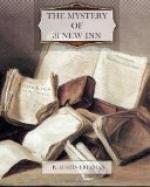One comfort was left to me; my pipe was in my pocket. I made shift to load it in the dark, and, having lit it with a wax match, took the opportunity to inspect the interior of my prison. It was a shabby affair. The moth-eaten state of the blue cloth cushions seemed to suggest that it had been long out of regular use; the oil-cloth floor-covering was worn into holes; ordinary internal fittings there were none. But the appearances suggested that the crazy vehicle had been prepared with considerable forethought for its present use. The inside handles of the doors had apparently been removed; the wooden shutters were permanently fixed in their places; and a paper label, stuck on the transom below each window, had a suspicious appearance of having been put there to cover the painted name and address of the job-master or livery-stable keeper who had originally owned the carriage.
These observations gave me abundant food for reflection. This Mr. Weiss must be an excessively conscientious man if he had considered that his promise to Mr. Graves committed him to such extraordinary precautions. Evidently no mere following of the letter of the law was enough to satisfy his sensitive conscience. Unless he had reasons for sharing Mr. Graves’s unreasonable desire for secrecy—for one could not suppose that these measures of concealment had been taken by the patient himself.
The further suggestions that evolved themselves from this consideration were a little disquieting. Whither was I being carried and for what purpose? The idea that I was bound for some den of thieves where I might be robbed and possibly murdered, I dismissed with a smile. Thieves do not make elaborately concerted plans to rob poor devils like me. Poverty has its compensations in that respect. But there were other possibilities. Imagination backed by experience had no difficulty in conjuring up a number of situations in which a medical man might be called upon, with or without coercion, either to witness or actively to participate in the commission of some unlawful act.
Reflections of this kind occupied me pretty actively if not very agreeably during this strange journey. And the monotony was relieved, too, by other distractions. I was, for example, greatly interested to notice how, when one sense is in abeyance, the other senses rouse into a compensating intensity of perception. I sat smoking my pipe in darkness which was absolute save for the dim glow from the smouldering tobacco in the bowl, and seemed to be cut off from all knowledge of the world without. But yet I was not. The vibrations of the carriage, with its hard springs and iron-tired wheels, registered accurately and plainly the character of the roadway. The harsh rattle of granite setts, the soft bumpiness of macadam, the smooth rumble of wood-pavement, the jarring and swerving of crossed tram-lines; all were easily recognizable and together sketched the general features of the neighbourhood




